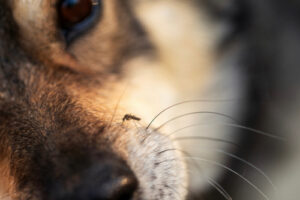Dogs are naturally curious, which often leads them to chase after buzzing insects. But when curiosity turns into a painful encounter, a dog stung by a bee can leave you feeling worried and unsure of what to do next. Bee stings are common in Boulder, especially during the warmer months, and while many stings are mild, some can cause more serious reactions. Below, we’ll discuss why dogs get stung, what signs to look for, and when to call Boulder Veterinary Hospital for professional care for your canine companion.
Why Dogs Get Stung by Bees
Dogs are playful explorers, and buzzing bees often catch their attention. When a dog investigates with their nose or paws, a bee may sting in self-defense. A dog stung by bee is most often stung around the face, muzzle, or paws, places where dogs try to sniff or swat.
Common Situations That Lead to Stings
- Playing in flower gardens or grassy areas where bees gather
- Chasing flying insects in backyards or hiking trails
- Accidentally stepping on a bee while running in the grass
Because Boulder is surrounded by natural landscapes, bees are part of daily outdoor adventures. Knowing the risks can help you stay alert.
Signs Your Dog Was Stung by a Bee
Recognizing the signs quickly can help you determine whether your dog needs veterinary attention. A dog stung by a bee may show mild, moderate, or even severe symptoms.
Mild Reactions
Most stings cause local irritation, including:
- Redness at the sting site
- Mild swelling
- Tenderness when touched
- Your dog licking or pawing at the spot
Moderate Reactions
Some dogs may show stronger responses, such as:
- Significant swelling around the eyes, lips, or muzzle
- Hives or patches of raised skin
- Persistent discomfort or whining
Severe Reactions
In rare cases, a dog stung by bee may experience a serious allergic reaction. Watch for:
- Difficulty breathing
- Drooling or vomiting
- Collapse or weakness
- Swelling that spreads quickly
If you notice severe symptoms, call Boulder Veterinary Hospital immediately at (303) 442-6262 for urgent care.
Why Some Dogs React Differently to Bee Stings
Every dog’s immune system responds differently to a bee sting. While one dog may have only minor swelling, another could react more strongly. Several factors influence how a dog stung by bee responds.
Location of the Sting
A sting on the paw may cause less concern than one on the face or inside the mouth, where swelling could affect breathing.
Number of Stings
Multiple stings at once increase the risk of a more serious reaction, as more venom enters the body.
Individual Sensitivity
Just like humans, some dogs are more sensitive to bee venom. Dogs with a history of allergies or previous reactions may need closer monitoring.
What to Do If Your Dog Was Stung by a Bee
If you realize your dog stung by a bee is showing signs of discomfort, the best step is to remain calm and assess their condition. While mild cases may pass quickly, you should always observe your dog closely and contact a veterinarian if symptoms worsen.
Step 1: Stay Calm and Observe
Dogs pick up on their owner’s emotions. Staying calm helps prevent your pet from becoming more anxious.
Step 2: Check for Swelling or Distress
Look at your dog’s face, tongue, and throat area to ensure there’s no sudden swelling that might interfere with breathing.
Step 3: Call Boulder Veterinary Hospital
If you have any concerns, reach out to (303) 442-6262. Our team can advise you on the next steps and determine whether your dog should be seen right away.
Risks of Bee Stings for Dogs in Boulder, CO
Boulder’s climate and natural setting create plenty of opportunities for encounters with bees. While most stings are manageable, a dog stung by bee may still face risks.
Allergic Reactions
Anaphylaxis, though rare, can occur after a sting. This requires immediate veterinary attention.
Secondary Infections
Scratching or licking the sting site too much may lead to skin irritation or infection.
Outdoor Hazards
Bee stings may occur alongside other environmental concerns, such as wasp stings, ant bites, or contact with toxic plants.
When You Should Call Boulder Veterinary Hospital
Knowing when to seek veterinary help is key. Even if your dog stung by a bee shows mild symptoms, it’s best to stay in touch with our veterinary team.
Call Right Away If:
- Swelling is severe or spreading quickly
- Your dog is having trouble breathing
- Multiple stings occurred at once
- Your dog has a history of allergic reactions
We can provide prompt urgent care at Boulder Veterinary Hospital tailored to your dog’s needs. Calling ahead allows our team to prepare for your arrival if urgent attention is needed.
How Veterinarians Treat Dogs Stung by Bees
Veterinary treatment depends on your dog’s symptoms. If your dog stung by a bee requires professional care, the team at Boulder Veterinary Hospital may recommend different approaches to help your pet recover comfortably.
Monitoring and Assessment
Your veterinarian will check your dog’s heart rate, breathing, and overall condition to rule out complications.
Treatment for Pain or Swelling
Depending on the reaction, supportive care may be provided to reduce discomfort and inflammation.
Emergency Response
In severe cases, emergency treatment may be necessary to stabilize breathing and prevent further complications. Every treatment plan is customized for your pet’s situation, which is why calling Boulder Veterinary Hospital at (303) 442-6262 is always the safest choice.
What You Can Do to Prevent Bee Stings in Dogs
While it’s impossible to avoid every bee encounter, you can take steps to reduce the chances of a sting. A dog stung by bees is often just in the wrong place at the wrong time, but awareness makes a difference.
Tips for Prevention
- Supervise outdoor play, especially in areas with flowering plants
- Keep your yard clear of fallen fruit or sweet-smelling items that attract bees
- Avoid letting your dog chase insects
- Use leashes during hikes or park visits to limit risky encounters
Why Prompt Veterinary Care Matters
Even if a dog stung by a bee seems fine at first, symptoms can develop over time. Prompt veterinary care offers peace of mind and ensures your pet gets the attention they need. Boulder Veterinary Hospital is dedicated to helping pets live safe and healthy lives. If your dog has been stung, our experienced team is here to evaluate, treat, and provide guidance for future prevention.
Protect Your Dog During Bee Season in Boulder
Bee stings are an unfortunate but common part of life for active dogs in Colorado. Whether your dog experienced mild swelling or showed signs of a stronger reaction, knowing how to respond makes a big difference. If you have any concerns about a dog stung by bees, call Boulder Veterinary Hospital at (303) 442-6262. Our team is ready to provide the care and support your pet needs.





